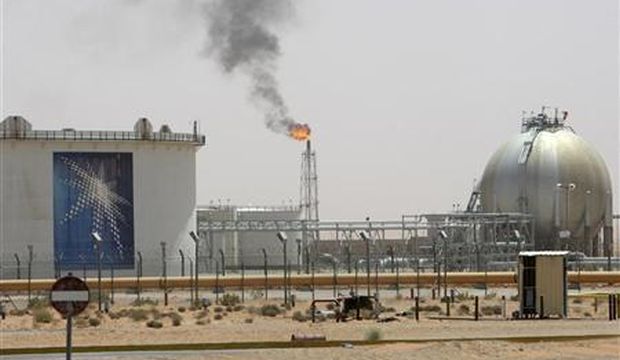
A gas flame is seen in the desert near the Khurais oilfield, about 99 miles (160 kilometers) from Riyadh, in Saudi Arabia, on June 23, 2008. (Reuters/Ali Jarekji)
Dammam, Asharq Al-Awsat—It is too early for OPEC countries to make a decision on lowering the organization’s output target, United Arab Emirates Energy Minister Suhail Al-Mazroui told reporters on Tuesday, despite oil prices falling below the critical 100 US dollar per barrel mark in recent months amid weak global demand and steady supply boosted by the US shale oil boom.
Speaking at a news conference in Abu Dhabi, Mazroui said it was “premature to decide” on lowering the group’s output in order to stabilize prices, saying OPEC would “meet to discuss and agree on measures” in November.
This comes one week after OPEC Secretary-General Abdullah Al-Badri said the group would discuss lowering its daily output of 30 million barrels per day (bpd) by 500,000 bpd during its November meeting.
But on Friday, in comments carried by energy news and information provider Platts, Badri said his comments had been misinterpreted, and that he was not talking about lowering the production ceiling by 500,000 bpd but rather that he expected a drop in demand for OPEC oil next year by the same amount.
Mazroui seemed to echo Badri’s later comments, saying that OPEC was more concerned about the stability of the oil market than it was about prices. He added that the organization had “two months to monitor the situation and as soon as we meet we will work to make sure our supply meets demand.”
This month’s report from the organization also supported Badri’s latter comments, though it said the organization expected a fall in demand of 800,000 bpd, which would bring OPEC’s daily production down from 30 million bpd to 28.2 million bpd. In a statement last week, the International Energy Agency also predicted that OPEC production would fall, to 29.6 million bpd in 2015.
It also said it expected demand for OPEC oil in the fourth quarter of 2014 to reach above the organization’s current output level, to 30.6 million barrels per day.
This comes as oil prices fell below the 100 dollar per barrel mark for the first time in more than a year earlier this month. Several OPEC countries including Saudi Arabia rely on oil prices staying above 100 dollars per barrel in order to meet budgetary requirements.
But prices have fallen steadily in recent months on the back of a boom in US shale oil production, and are currently down from 116 dollars per barrel in June to a two-year low of 97 dollars per barrel, this despite earlier fears that tumultuous events in OPEC members Iraq and Libya would severely affect global oil supply and push up prices.
However, OPEC producers appear unworried by the price dip, saying several times that they are not concerned by what they believe to be short-term fluctuations. Speaking to reporters on Friday, Saudi Oil Minister Ali Al-Naimi seemed to play down the impact of the recent price drop, replying to questions on OPEC concerns about prices by asking: “Why are you worried about the oil market?” according to Reuters.
He previously said the Kingdom considered the 95–110 dollar price range a fair one for both buyers and producers, and the “most ideal” for the Kingdom.
This was echoed on Tuesday by the undersecretary of the UAE’s Ministry of Energy, Matar Al-Neyadi, who told reporters in Fujairah he thought the existing prices were “fair.”
